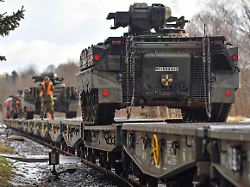In the event of a crisis
Germany is building a military corridor with neighbors
January 30, 2024, 9:31 p.m
Listen to article
This audio version was artificially generated. More info | Send feedback
Germany is working with neighboring Poland and the Netherlands on a joint military corridor to speed up the transport of troops and material – for exercises and in the event of war. But this requires investments worth millions.
In view of the threats from Russia, Germany, Poland and the Netherlands want to improve the framework conditions for the smooth transport of troops to NATO’s eastern flank. Representatives of the three EU and NATO states signed an agreement for a so-called model corridor. For example, it aims to standardize specifications for troop transport and shorten long bureaucratic processes. It is also about expanding infrastructure and transport capabilities.
Germany, the Netherlands and Poland played a central role as a geographical connection between the North Sea ports and the particularly exposed alliance area in the east of the alliance, the German Ministry of Defense said about the project. Credible deterrence only works if troops on the eastern flank can be reinforced and supplied smoothly.
For Germany, the agreement was signed by Defense State Secretary Siemtje Möller. Defense Minister Boris Pistorius, who initiated the project for more military mobility, actually wanted to come in person. However, he had to cancel the appointment in Brussels at short notice due to illness. Money for expanding the transport infrastructure for military purposes comes, among other things, from the EU. The EU Commission recently announced that Germany and another 17 countries would receive around 807 million euros for projects this year.
Of this, 92 million euros are planned for Germany. As the responsible EU Commission announced, the money is earmarked for the renewal of a railway bridge in Hanover-Ahlem, the expansion of the Ulm-Dornstadt goods handling terminal and for a siding at Sechtem train station in North Rhine-Westphalia. The passenger transport network will also be improved, it said.
Around a year ago, the EU Commission mobilized 616 million euros for similar projects. At that time, Germany contributed around 155 million euros, which were earmarked, among other things, for strengthening bridges and new freight handling terminals.
